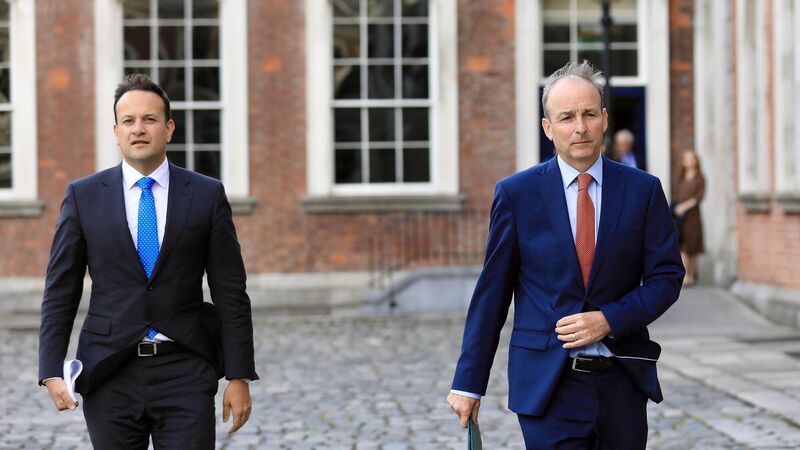Micheál Martin says he has confidence in Leo Varadkar

Leo Varadkar and Micheál Martin. File picture: Julien Behal
Taoiseach Micheál Martin says he has confidence in Leo Varadkar, despite growing pressure on the Tánaiste after it emerged he passed confidential documents outlining a pay deal between the Irish Medical Organisation and the Government to the rival National Association for GPs (NAGP).
Mr Martin further said that he does not believe Mr Varadkar broke any laws in doing this.
Mr Varadkar will address the Dáil on the matter tomorrow, an appearance Mr Martin said he would "not preempt".
However, the Taoiseach said that the pay deal "should have been public earlier" and said his predecessors' motivations were right in passing on the document to the NAGP, which was headed by his friend Dr Maitiu O Tuathail.
Asked if he had confidence in his Tánaiste, Mr Martin was unequivocal, saying that while he believed the document should not have been sent as it was, no illegality had taken place.
"Yes. I don't have an issue there in terms of how we're working together.
"This is not best practice and the Tánaiste himself has accepted that. And this was not the appropriate way to deal with a document of this kind, in terms of the manner in which it was sent to the president of the NAGP.
"My own view generally on an agreement of this kind, all I have to say is that, given the amount of public money involved in so far as it relates to chronic disease management for example for gms patients, and it revolves the reversal of FEMPI cuts that this should have been public knowledge much earlier that these agreements."
Mr Martin said the Tánaiste had been acting out of a desire to get the €210m deal supported by as many GPs as possible.
"I think that the objective was one of endeavouring to get GPs on board. I see no issue with that. I think that was important because we did need to advance the situation in relation to that contract everyone had been calling for a new contract."
Simon Harris, who was Minister for Health at the time, has said that he did not know that Mr Varadkar had shared the details of the IMO agreement with the Government on general practice with a member of the NAGP.
But he accepted Mr Varadkar’s “bona fides” and what he had been trying to achieve.
Mr Harris, who is now the Minister for Higher Education, told RTÉ radio’s Today with Claire Byrne show that Mr Varadkar had been passionate about the deal with GPs and wanted more GPs to get behind it.
The Tánaiste had not been undermining him, said Mr Harris. Mr Varadkar’s motivation had been getting the information to as many GPs as possible.
Some of the comments made over the weekend about Mr Varadkar and the incident were “grossly inaccurate and unfair,” he said.
Meanwhile, Sinn Féin's Finance spokesperson Pearse Doherty said it had been “deeply inappropriate and absolutely wrong” for Mr Varadkar to share the agreement that had been made between the Government and the IMO with the NAGP.
Fine Gael representatives who defended Mr Varadkar were using “spin and deep deflection,” Mr Doherty told RTÉ radio.
The agreement with the IMO was a multi-million euro negotiation so the Tánaiste had a number of questions to answer, he said.
On the same programme, Minister of State Patrick O’Donovan asked what Mr Varadkar’s motivation was. He wanted to ensure there wasn't a break in general practice service.
Mr Varadkar said he regretted he didn't share the agreement in a more formal manner.
Fianna Fáil TD Barry Cowen said it may have been inappropriate for Mr Varadkar to send a document to the NAGP and it was not best practice, but he believed Mr Vardakar acted with the best of intentions.
It was an issue that everyone was anxious to see resolved at the time.
Mr Varadkar had to “cop on and move on” and learn from the mistake. There were “bigger and broader” issues to be dealt with such as Covid-19 and Brexit. A mistake was made, but it was not a fatal one, “so we can move on.”
The Green Party’s Patrick Costello there were questions that needed to be answered and Mr Varadkar would do so on Tuesday in the Dáil.
“The Tánaiste needs to answer questions and we need to let the process play out," he said.
“There are questions to be answered and it is important to get the further scrutiny that is needed. We need to let this play out and get full disclosure.”





